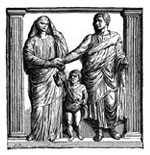
The Catholic Church After Obergefell
THE CASE FOR ORTHODOXY
The U.S. Supreme Court’s recent and most unfortunate decision in Obergefell v. Hodges to legalize same-sex marriage throughout the U.S. has provided American Catholics with a moment to reflect on and reconsider the stance of the Church vis-à-vis both our political order and our culture. This is useful, and indeed essential, if we have any interest in furthering the Church’s apostolate of converting the world.
The first lesson we should take away from Obergefell is that the Church’s message about human sexuality has little resonance in American life. Whatever debate there was over homosexuality in general, and same-sex marriage in particular, was not framed by Catholic natural-law doctrine but rather by Protestant biblicism or by appeals to historical precedent. Although Catholics are at fault for not raising natural-law arguments early and often, the fact that almost nobody adverts to such arguments shows that there is no acceptance or even understanding of a Catholic view of reality among the majority of our countrymen. Following from this is another lesson: There is little or nothing to hope for from the political order. People who put their faith in a constitutional amendment or some kind of political response to same-sex marriage are deluded. Not only has such a response no chance of achieving its goal, it is the wrong way to fight what is essentially a spiritual and intellectual battle.
The question we Catholics in the U.S. must ask ourselves is what we really want. Do we want the conversion of our country, including its political and economic structures, to the Catholic faith, or are we content with preserving a few key cultural or social markers, such as those that concern marriage or abortion? If we’re willing to settle for the latter, then we have to accept the reduction of the Church’s mission to a particular expression of cultural conservatism, real or imagined. Some of the difficulties with this I will outline below. But if our overriding goal is conversion, then we must distinguish the Church’s mission from that of any other group, including those Protestant Christians with whom we seem to have so much in common. In the past, Catholics were clear-sighted enough to see that the Protestant principle was one of dissolution, one that worked to produce the very cultural and social ills against which Protestants protested so much. This is not to deny the possibility, or even the necessity, of sometimes making common cause with non-Catholics on certain occasions for certain purposes, but we must never confuse the mission given to the Catholic Church alone by our Lord with that of any other group or cause.
Moreover, neither is a call for religious freedom sufficient. The Church in the U.S. has been devoting more effort lately to demanding such freedom than she has devoted to sharing the faith and converting our fellow citizens. But aside from the problematic history of religious freedom in America, which always presupposed the ability of the state to regulate and override the free exercise of religion, are we asking merely for the Church’s right to be a pressure group, to be one among so many other voices in the public square? Or will we claim our unique status as the Church instituted by Christ, and devote at least as much effort to converting our brethren as we do to asking for the right to be left alone?
You May Also Enjoy
Homosexuals regard the outlawing of same-sex "marriage" as a violation of political and cultural freedom - a soft despotism.
To be like ancient Rome, the U.S. in the 21st century has only to elect as its president a bachelor with same-sex partners and then to await plagues, invasions, and epidemics to hasten its decline and fall.
Viewed from the perspective of home and community, there's so much value attached to the work of stay-at-home mothers, that we've only just begun to count the cost of losing them to the workplace.

